Tommy Cash Dropped a New Single, but Who Really Gives a Shit?
Watch the new music video below.
Stay informed on our latest news!
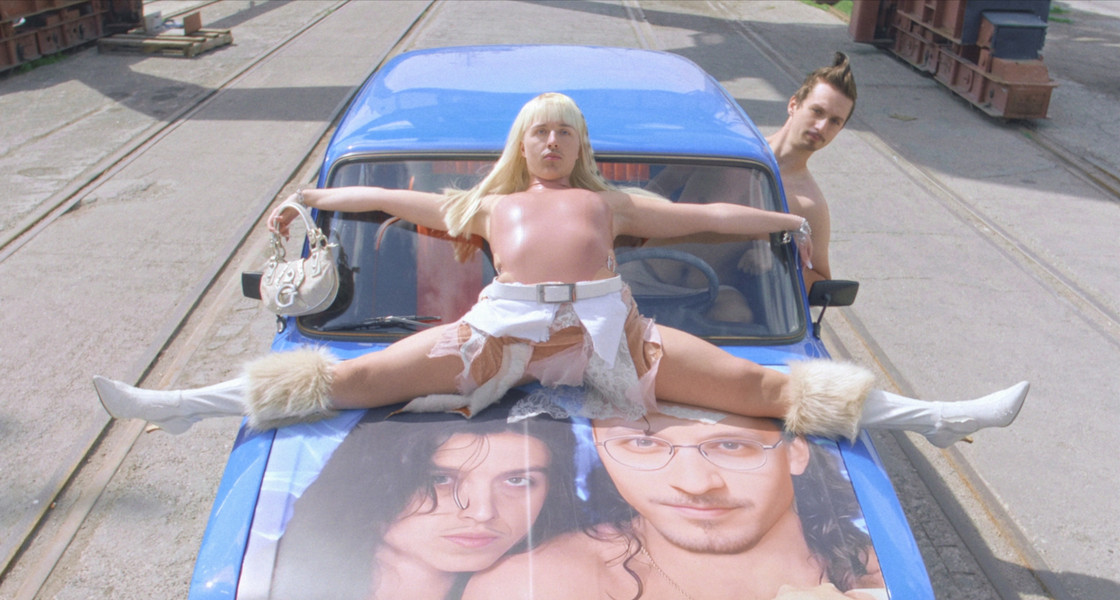
Watch the new music video below.
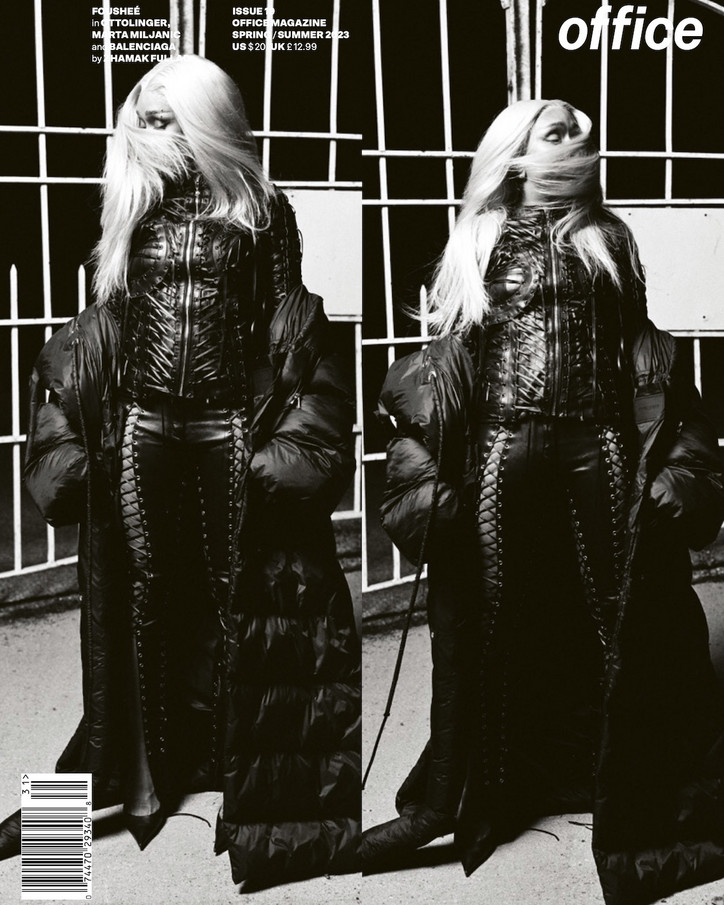
Since outgrowing my first pair of Doc Martens, I’ve had much more of a musical and cultural education, and through exposure, expanded my understanding of the subculture in both its modern and mainstream iterations. But it wasn’t until recently that I realized the final remnants of the stale punk archetypes in my mind had more renovating to do. Punk is purely about an anti-establishment attitude. It isn’t just about genre, and it isn’t about aesthetic choices or the amount of holes or ink on your skin. It’s defined by how you destroy the boxes that have been built around your craft, your culture and your rights as a human in this world. And today, though it may have been more of a gut instinct than an intentional act for singer-songwriter Fousheé, she’s solidified her place as the star of the modern punk movement.
I met the Jamaican, New Jersey-born artist on a winter afternoon at the Chateau Marmont. I’d listened to her music before, immediately familiar with the viral hit “Deep End” that had brought the young artist recognition as well as the hit “Bad Habit” by Steve Lacy, who had been an avid fan and frequent collaborator of the young singer since attending a show of hers in New York. On these tracks, her voice carries strong against softer melodies, offering emotion-fueled R&B energy, a sticky amalgamation of SZA and Etta James. But it wasn’t until I dug into her latest project, softCORE, that suddenly I sat up straight in my chair. Something was very, very different. These tracks were unlike anything I’d heard. They flowed with ease I’d have formerly thought impossible from quietly romantic, eerie ballads to literal screamo in seconds, before grinding the gears back into a folksy rhythm that felt bizarrely natural. While TikTok surely has provided its fair share of pop punk covers of Top 40 songs, and we all fell into our own phase with early aughts mashups, the transitions in Fousheé’s project from one sound to the next are something completely new. From sitting with softCORE, to meeting the soft-spoken leather-clad singer that day in Los Angeles, I can confidently report that there is no kitsch to what Fousheé is doing, no intentional “flipping the script” to generate a synthetic moment of hype. With her music, she harnesses authenticity, speaking to her own experiences with love and anger, expressing them through electrifying auditory range. She has created work which I am hesitant to even call a blend of “folk” and “metal,” though she describes it that way, as that would be giving the idea of genre too much credit at all. Without forcing it, Fousheé has created something far greater than a novel sound, she’s something new and groundbreaking, simply by following the feelings. And that, I would say, is truly anti-establishment.
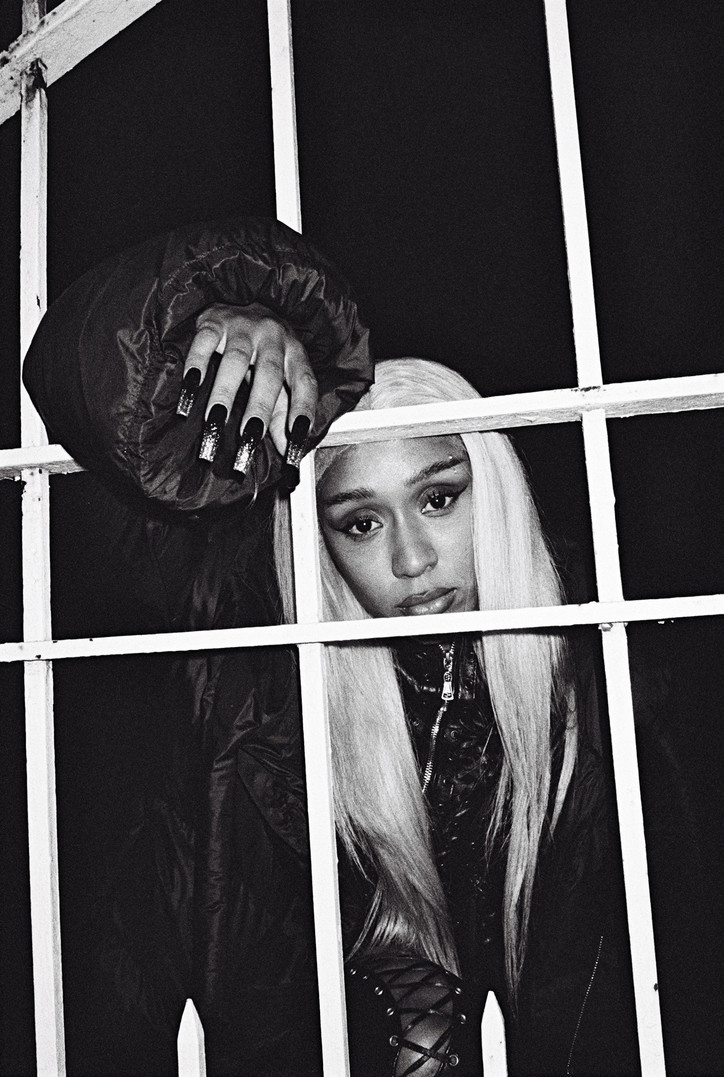
While the audience at large may have heard a lilt in the audiovisual gap between Fousheé’s first viral hit and her softCORE project, for the artist herself, the change of direction went almost unnoticed.
“It just happened so naturally,” she tells me, a honey-colored curl falling into her face, “It’s how I felt, and it reflected the music I was listening to. I didn’t notice how extreme the difference was until it was out.” And while her label had her back, believing in the song and video ideas that stood out against anything she’d done before, their support — or her audience’s — felt secondary.
“I think the need for me to express certain things holds a greater weight, personally, than anyone’s support. But I’m always like, I want that support, too. What if you take that leap and you’re completely in touch with yourself and no one likes it and no one supports your message?” But the endearingly soft-spoken Foushee before me finds her balance in a heartbeat, adding, “at the same time, I’m someone who likes harsh honesty. If it’s constructive, I can grow from it.” Suddenly I’m reminded that as shy as she may seem today, this is the same girl who put in hours perfecting her guttural, heavy metal growl.
Fousheé is full of yin and yang, even in reflecting on her East Coast roots. “I was born in Newark, and then I moved around Plainfield for a while. My mom immigrated from Jamaica, and we would try to work up to better neighborhoods. Then we ended up in Bridgewater, and we stayed there for a while. Pretty good area. That was the suburbs… I hated New Jersey growing up,” she confesses. “Now I appreciate it. I think I have a lot to owe to New Jersey for my eclectic music taste… It was a mix of the music New Jersey is known for that lent itself to my taste, but also my mom is Jamaican — so there was reggae and a lot of Celine Dion heavily playing in the house. And then I was just a black girl growing up, so I listened to hip hop and R&B. That's where I learned how to write metaphors and stuff. Battle rap. Smack music. When I would turn on the radio, it would be like ‘97. Overall, there was a whole world of different music that I was exposed to, and I don't think I would've been if it wasn’t for Jersey.”
Though there was alternative rock being played and made around her growing up, at the time it didn’t suit her. But years later, upon moving to New York, that facet of suburban subculture came back into the forefront, and sparked Fousheé’s interest. “It was in New York that I fell in love with guitar and live music.” Her mother, back in Jamaica, had been in an all girls band, and always encouraged Foushee’s musical experimentation and ventures, even from an early age. However, when I ask when she first thought of herself as a “musician” proper, Fousheé laughs and looks at the Praying bag printed with the words “give girls money” propped in her lap. “I always knew I wanted to be a recording artist, since maybe age five. But even today… I don’t know if I think of myself as a Musician.”
While I’d argue the contrary, it seems that for the burgeoning talent, admonishing the formal label for herself has been working out.
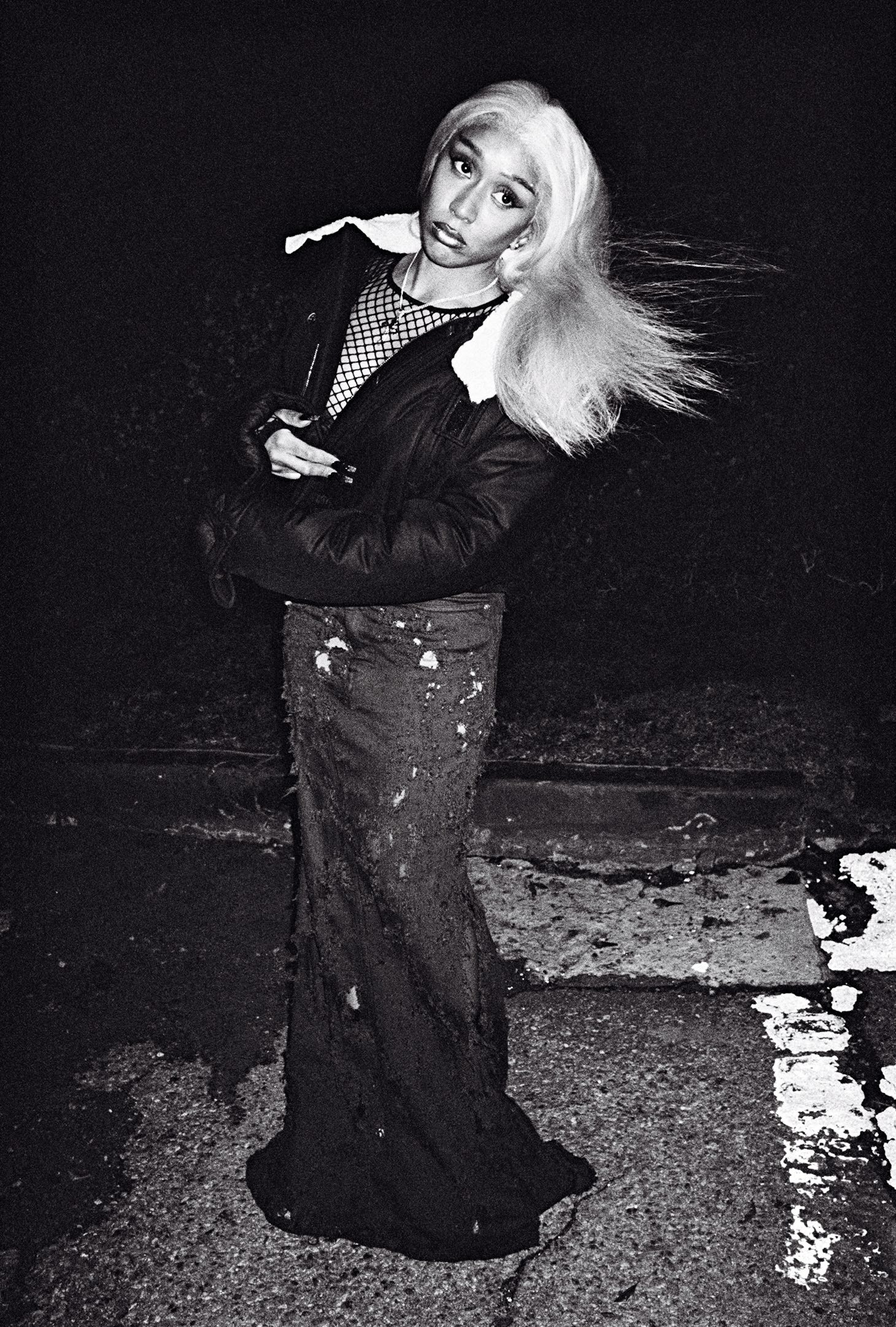
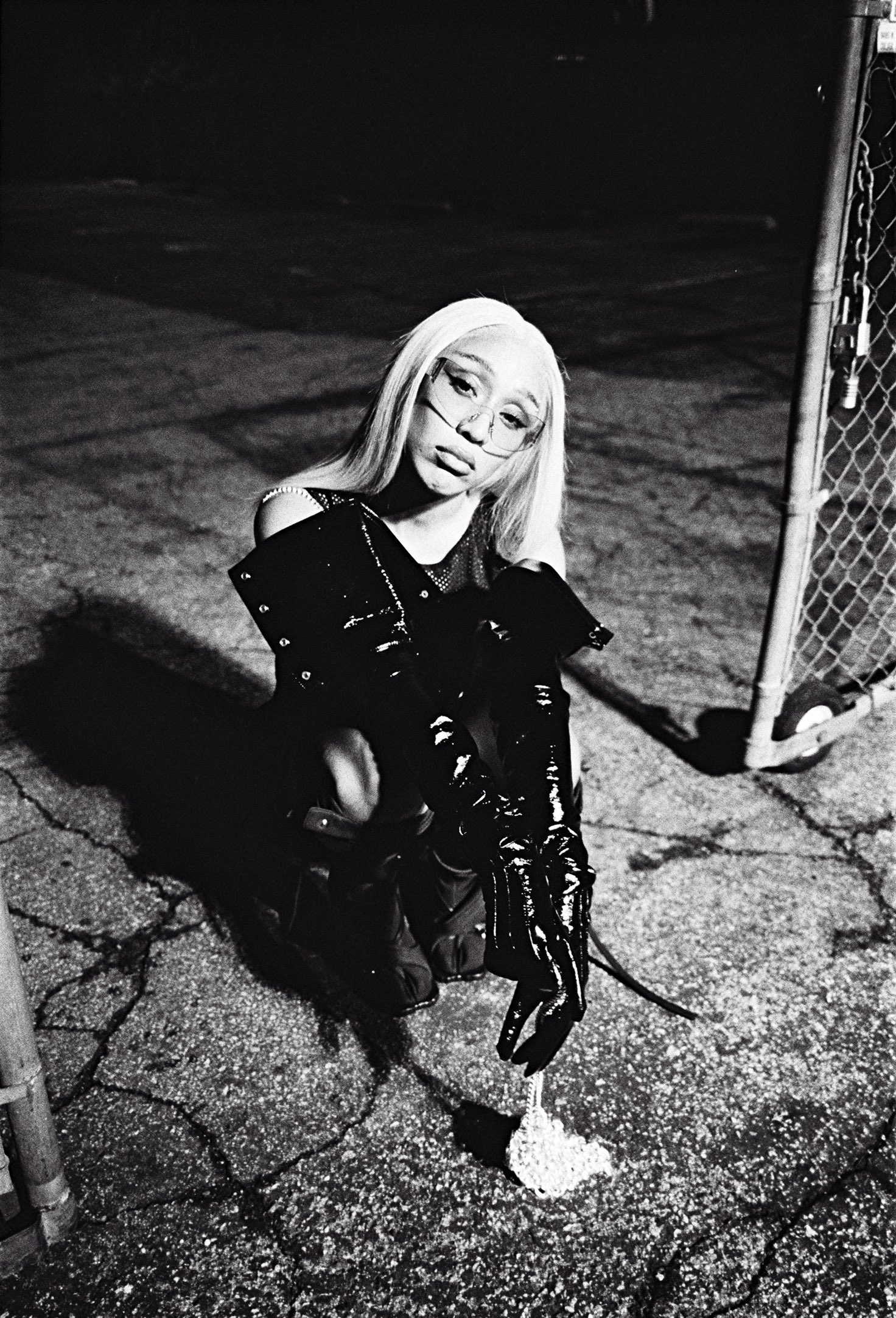
FOUSHEÉ wears JACKET by AMIRI, BRA by BURBERRY, TOP by MONZLAPUR, SKIRT by MARGIELA, BOOTS by PETER DO,
NECKLACE by MAOR
FOUSHEÉ wears JERSEY, SHORTS by 7 DAYS ACTIVE, GLOVES by ALEXANDRE AKHALKATSISHVILI, BAG by MARTINE ALI, SHOES by OTTOLINGER, GLASSES by BALENCIAGA
For the last three years, Fousheé has been finding her footing in the Los Angeles music scene. Since arriving on the West Coast, she’s found a group of fast friends who range from gothic tattoo artists, to models to other musicians — though it’s changed, like many things have for the young artist over the last few years.
“I ended up in Los Angeles because of Steve Lacy. I met Steve in New York at one of my shows — he’d come to the show to see one of the other artists, but afterwards, came back to introduce himself. Later, when he moved to LA, I decided to move with him and live in his house. It was a big house with some empty rooms. When I got here, I fell into the rap scene. Then from there, that just grew — I would be around, see Loopers, Nacel. I met different people, until I found my sound and my close-knit, tight-knit crew today.”
Out of those in the crew, she’s become especially fond of Izzy Spears, the former Anonymous Club member-turned-punk prodigy. “Every time I see him, we’re just drawn together. After we met at a party, we kept in touch, then we got really close these past few months making music together.”
The idea of Izzy and Fousheé being drawn together makes perfect sense. In a crowded room, these two would be creative magnets — each buzzing with an energy unparalleled by the average artist. That punk attitude, they have it: both in their persons and their sound. It’s clear, unapologetic and uncomfortable for them as artists as much as their audiences. Izzy’s is overt and overpowering, his lyrics brash, violent and homoerotic, while with Fousheé, it’s not always on the surface — in a track that at first feels slow, without warning her voice will make an aggressive lunge forward, screaming and fighting for air. But though the layout and the lyrics diverge, it’s clear that Spears and Foushee have found common ground alongside a group of equally gifted friends in the creative landscape they’re discovering and creating together as punks, and artists of color, in a genre that has historically lacked diversity.
Though she’s now drifted from the rap and R&B community, Lacy led her into the edgier side of the city’s creative scene she spends her time around today. She still works closely with Lacy, and considers that sound and lifestyle an important aspect of all she does. “I always feel like I'm trying to juggle both worlds, this very grungy world and then this very folksy world. I think what Steve and I make is really like folksy soul music. But I want to figure out a way to exist in both. That's why I made softCORE.”
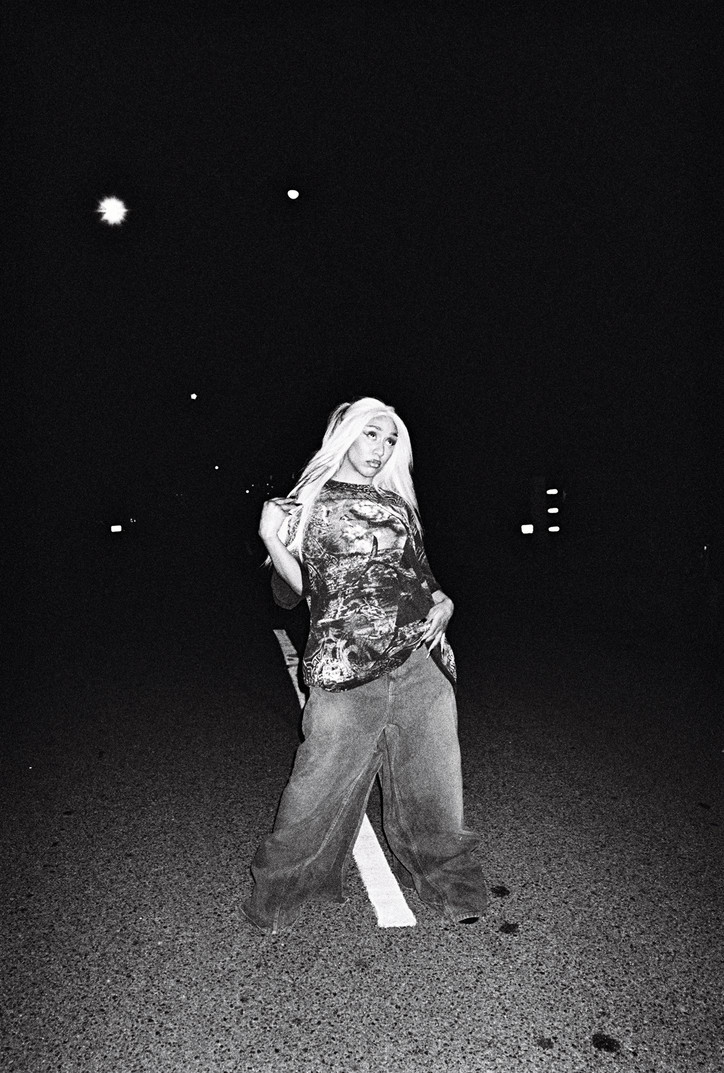
FOUSHEÉ wears JEANS by BALENCIAGA, T-SHIRT is TALENT’S OWN, SHOES by MOONBOOTS
Having had a metal track on repeat for the year prior, and drawing on punk ethos for her project, softCORE gets emotional. Where did the anger come from? “From being angry.” She tells me, point-blank and without hesitation. “I think when you feel a certain way, you're drawn to certain sounds.” But while evoking those feelings comes easily to her these days with the new tracklist, she’s still in touch with the other side of it all. “On tour, we lived on both ends of the spectrum. Listening to metal before we went on stage, opening with softCORE stuff, and then singing “Sunshine” with Steve — I would be splitting myself in two every night.”
But it seems like she’s figuring it out and finding her confidence, experiencing a catharsis of sorts through the heavy metal facets of her new sound. It’s the same rush of endorphins a therapist might have a patient explore through screaming at the top of their lungs. “I think as the tour went on, I started working on my growl. Not that I incorporate it into the show every night, but I just do it on “'i’m fine” and “in secret.” [Laughs] At first, we used to put a bunch of distortion, and then towards the end I didn’t need it. It's scary, though. I don't want to go too deep into any world.”
But which world does the Foushee just an arms length away from me belong in? “I think the person you see on stage is more of an extreme version of me. I'm pretty soft spoken. That’s “Brave Me.” I have to hype myself up every time — I used to have extreme stage fright as a kid. But now I love it… The first time I felt that stage fright disappear was at this open mic that my aunt forced me to do. I was 16. I had performed before then in school and stuff, but I think that experience really broke me, because I failed so hard. I did so badly, and the host was like, “Make some noise for her. It's not easy to get up here.” I remember those words, and thinking to myself, That means I suck. I was like, I’ve got to get better. I’ve got to nail it.”
For most, failure doesn’t eradicate fear. It can easily be a recipe for that fear to become crippling. But for Fousheé, who defies odds at every turn, it’s the embracing of fear and weaponizing of criticism that adds flavor and feeling to her craft. In fact, not only does she use the fear to her advantage, it’s inspired her to push the stage persona, aesthetic and sound behind softCORE even further. “I think people are a little scared. I had friends who thought I was in the Illuminati [after releasing the project]. But I love it. I think that was my favorite part of the tour — scaring people. My favorite part of performing is the reaction. I like to think that I bully people up there, and it gives me the sense of control that you can never, never have, because every audience is different and every day is different. When I'm like, You're all my little bitches today,that brings out a certain confidence. Especially during that song “i'm fine”. It’s like, guys, I'm just going to sing this pretty song.
“That song was actually the first time we tried that concept of merging the two sounds. It came up when I was on tour with James Blake and we were in Philly — I was so sad during that time, and singing those slow songs, I just wanted to scream. I was like, “Ooh, what if I do a song that's like half folk, half metal?” So we went into the studio, the next day and recorded the track. That was it. I immediately knew I wanted to do a whole album of that. Literally, we didn't overthink it at all. Just one of the quickest songs that I made off that project… But that’s exactly what I'm trying to change now, that process. I want to reflect on the past and think about the future more. But I'm always asking myself, How do I feel right now?
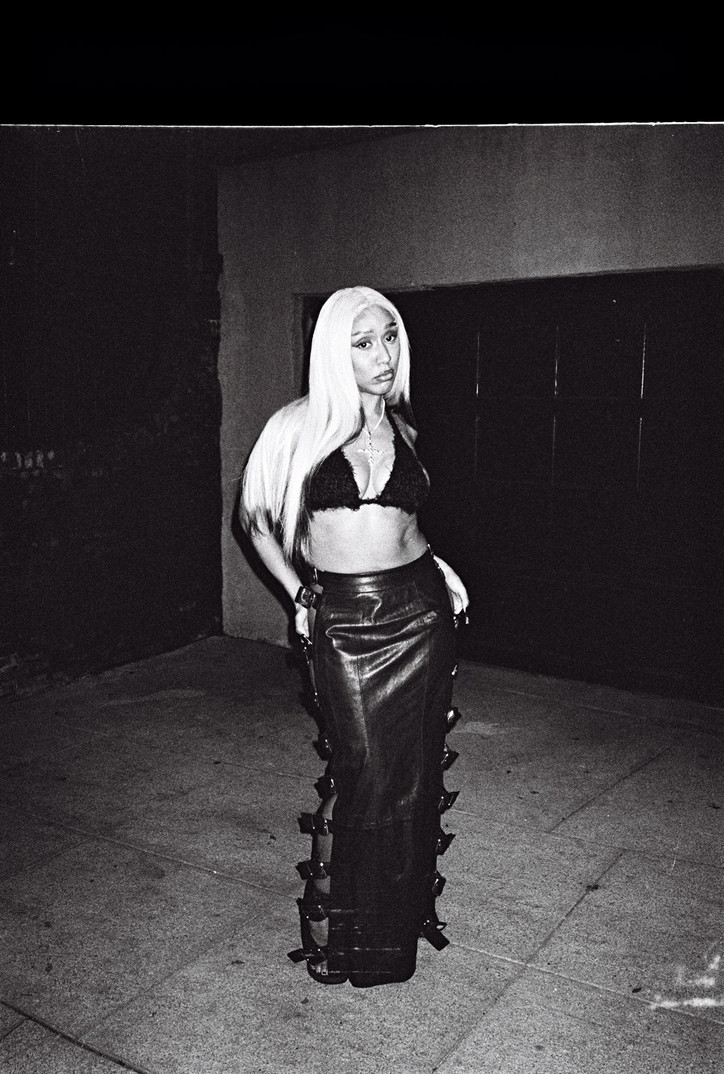
FOUSHEÉ wears BRA by SUSS, SKIRT by ALABAMA BLONDE, SHOES by BURBERRY
Fousheé’s mind and process swing from one end of a pendulum to another. But rather than coming off as erratic, it’s more like a Newton’s cradle, with a muted and mathematical rhythm to it. It’s about the center of the Venn diagram, and building an understanding of balance. “I want to make more thoughtful music. I used to be really thoughtful about every word, or at least the format of it. But I reached a point where I was like, I need to be more free flowing and stream of thought. I was doing that for a while. Now I hope to meet in the middle somewhere.”
Steve Lacy, while a part of her folksier friend group, has been a major part along every step of her journey — the sweet and the screamo. “We have similar tastes in what we like, and it's a good balance, because I think where he is more musical, I tend to think more about the words. We just do this back and forth type of thing. He's Gemini, I'm a Leo, so we just have fun in the studio. That's one of my best signs to hang out with. We just move around the studio, laughing and just picking up different instruments and ordering food. We're just talking about life. That's what it’s like.”
For the future, alongside slowing down her thoughts, Fousheé is focusing on a new project: her first full album. “I would say that was a project, softCORE, so I think I could take more time with the process and make something with a little more attention to detail musically with the next body of work. It might sit more in the middle, so maybe I won't be screaming. [Laughs] I want to let life naturally lead me to what's going to be next. Maybe it's just going to be another level of this style, and just refining the balance of it. Well, OK, maybe I will yell, but I'm just going to go into the studio and see how it goes. When I just do only one side of things or the other, I feel like something's missing. I have to take it day by day.”
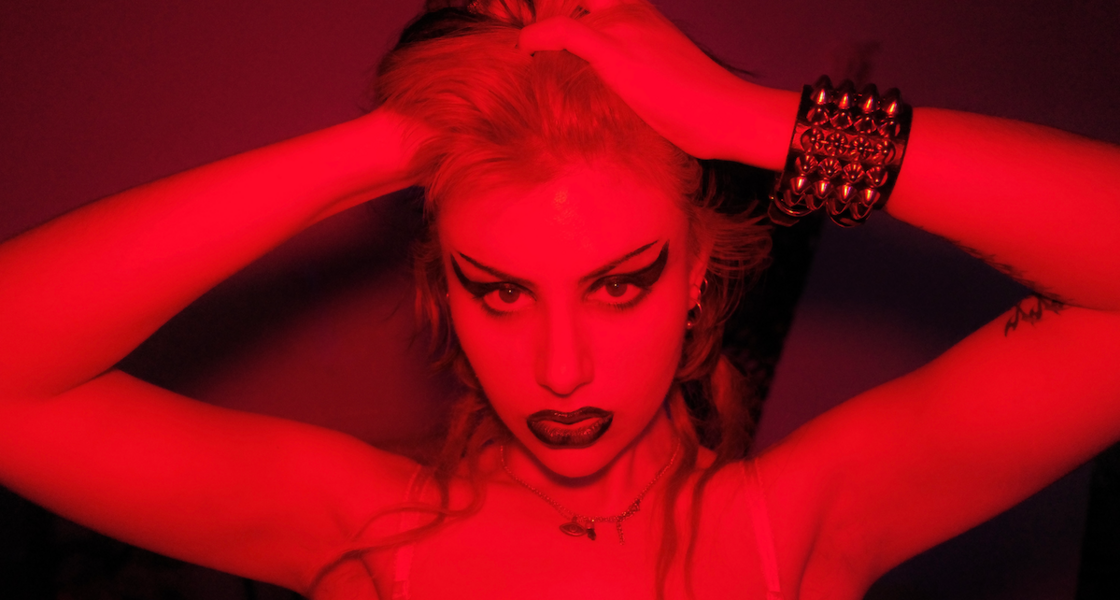
Pretty, like all words, has a history. Seemingly harmless yet rooted in a narrative of power and control. Taraneh channels this in her own song of the same name. Released originally in her bittersweet album, A Fleeting Feeling (2022), she returns with a video that mirrors the song's melancholic melody. She sings hauntingly over drop-tuned guitars and drums reminiscent of 90s lo-fi acts, as if to suggest that the scene is not married to a specific moment in time. She subverts the notion of pretty as a signifier by using the word ironically, as evident when she sings, "Oh, you like my hair, thank GOD." If you couldn’t tell within the first ten seconds of the video, she couldn't care less what you think. The same goes for her clones, a distillation of own dimensions.
Inspired by an eerie dream and Diamanda Galas’ "Double Barrel Player," Taraneh and her doubles crawl, sulking, smoking, holding hands, and dragging around idly in the dingy studio. They don't seek validation; they'd probably laugh if you offered it. By the end of the video, the distinction between the girls — Taraneh, Thoom, Comet, and Miss Madeline — melts away; each could be any girl, just as tired of being met with the same boring compliment.
Video Credits
‘Pretty’ is typically used as a compliment. What is the song about? Are you addressing someone in particular with the lyrics?
The word ‘pretty’ doesn’t mean much to me other than a low-effort compliment. Maybe even a diss. I think that’s a central part of this song. I wrote it when I was 19 and realized that beauty won’t save me, that beauty won’t save us. Or maybe it will, who knows. In some ways it’s about that, but more than anything for me, it’s a song about power and control. I think most things boil down to matters of power and control. It’s rather straightforward and the lyrics are pretty direct, but I’m asking a lot of questions in the song to no one in particular that I don’t really care to hear the answers to — rhetorical questions, if you will. The lyrics are flexible and fluid enough to land with people how they want them to, or how they will, I should say. But I also just love exploring the concept of beauty, you know? We live and die for it. And it’s like sand through your fingers. That’s a crazy concept to me.
The lyrics are repetitive, almost like an anthem, or a chant, heightened by the repetitiveness of the video. You also include a single line that refers to your own hair and the outfits you wear. Why was that?
The song is like a trance to me. A trance that swells and then falls apart and I think a lot of my music is kind of trance-like. That’s a big inspiration always in my work, this notion of submitting to the trance. So the repetitive lyrics and visuals are meant to service that objective in a way.
I got the idea for the music video in a dream I had a few months back, where I saw a bunch of faceless clones of myself and I was their leader. I had recently been talking to Comet who's in the video about this concept of a costume and I realized that my hair and the way I dress is so conducive with that notion. It can be a costume. I think that's probably why I had the dream in the first place. It’s funny because that being said, the video is in many ways built around the concept of a costume that centers my hair and the clothes I wear, but the lines about my clothes and hair in the song are pretty obviously sarcastic. ‘Oh you like my hair, thank GOD.’ Just like ‘pretty’ is a low-effort compliment, ‘I like your hair’ or ‘I like your style’ is just as low-effort to me if not more. Which is fine, it’s just boring, even if it’s honest.
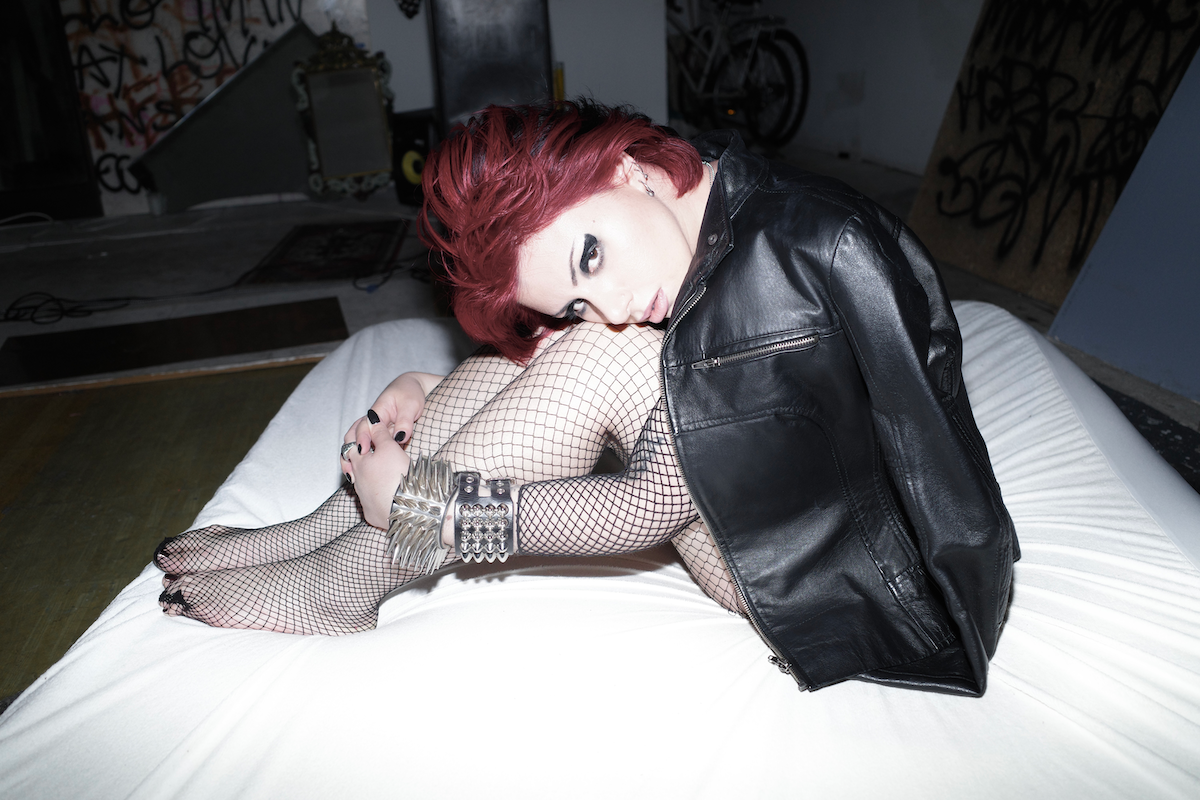
Does each girl in the video — you, Thoom, Miss Madeline, and Comet — represent a different part of you?
I wouldn’t say that they necessarily represent different parts of me, but I think we could frame everyone featured in the video as some representation and distillation of power. The girls in the video are some of my closest friends. I wanted the video to be kind of a depiction of my life in a way but dialed up to the point of theatrics, so I wanted to involve my friends. It only felt right. But then I also happen to have very powerful friends — we’re a very powerful bunch. I think in some ways power can be distilled down into an archetype. It’s a feeling, a state of being more than an attribute. And if you embody it, it’s true.
It’s almost like you capture this universality around the word “pretty” and how it’s used to refer to women in a very specific context, is the video meant to defy that?
Yes and no. I think many things are as good or bad as we want them to be. I personally care about and value beauty, but I think beauty is and can be many things. Just like I care about and value ugliness, which also is and can be many things. I think more than anything it’s about making a concept your own. Both the video and the song are really meant to provide people with what they need when they find it. I think that things find us when we need them to and we see them the way that we want to. Disorientation, empowerment, inspiration, disgust, offense. Whatever. As long as people watching take away something, anything.
There’s also a dark, grungey feel with the lo-fi camera and overall dim lighting. Was this purposeful or an extension of this dream you had?
I like visual media that you can’t necessarily place temporally. At least right now that’s something I really gravitate toward. The video is really a glimpse into my dreamscape, you know? This video is based on this dream I had and ultimately I wish I could have just screen recorded my dream because it looked really cool there but I couldn't so we made the video instead. This is pretty close to what I saw, though, which is great.
Actually, I originally wanted the video to be the same concept but in stop-motion with Barbies like in that Todd Haynes Karen Carpenter biographical film “Superstar” but with all the Barbies dressed like me. I still love that concept but thought it would be cool to first explore this idea of a character and costume on myself and my friends. But those quick cuts are with stop motion in mind. I love the Diamanda Galas music video for her song “Double Barrel Prayer.” That was a big inspiration for the video and informed a lot of the lighting choices in particular. I was just watching it a bunch before we started filming “Pretty” and I wanted to pull in some references from that. I like how stripped down the concept is in that video and you can see just this really strange bizarre character in Galas which I admire and really relate to in many ways. I watched it with Nat Cherry who shot the “Pretty’” music video and there’s this performance shot in “Double Barrel Prayer” that we thought would be cool to draw from. Minimal set, simple layout. Drastic lighting. We shot it at my friend Bobby’s place who’s a really cool painter and we turned his studio into a ‘stage.’ It’s where we always hang out and I dressed how I always dress and wanted it to reflect the image in my head and I think we nailed it. High budget videos are cool, of course, but sometimes you don’t need much to get across what you’re trying to say. That’s a big inspiration.
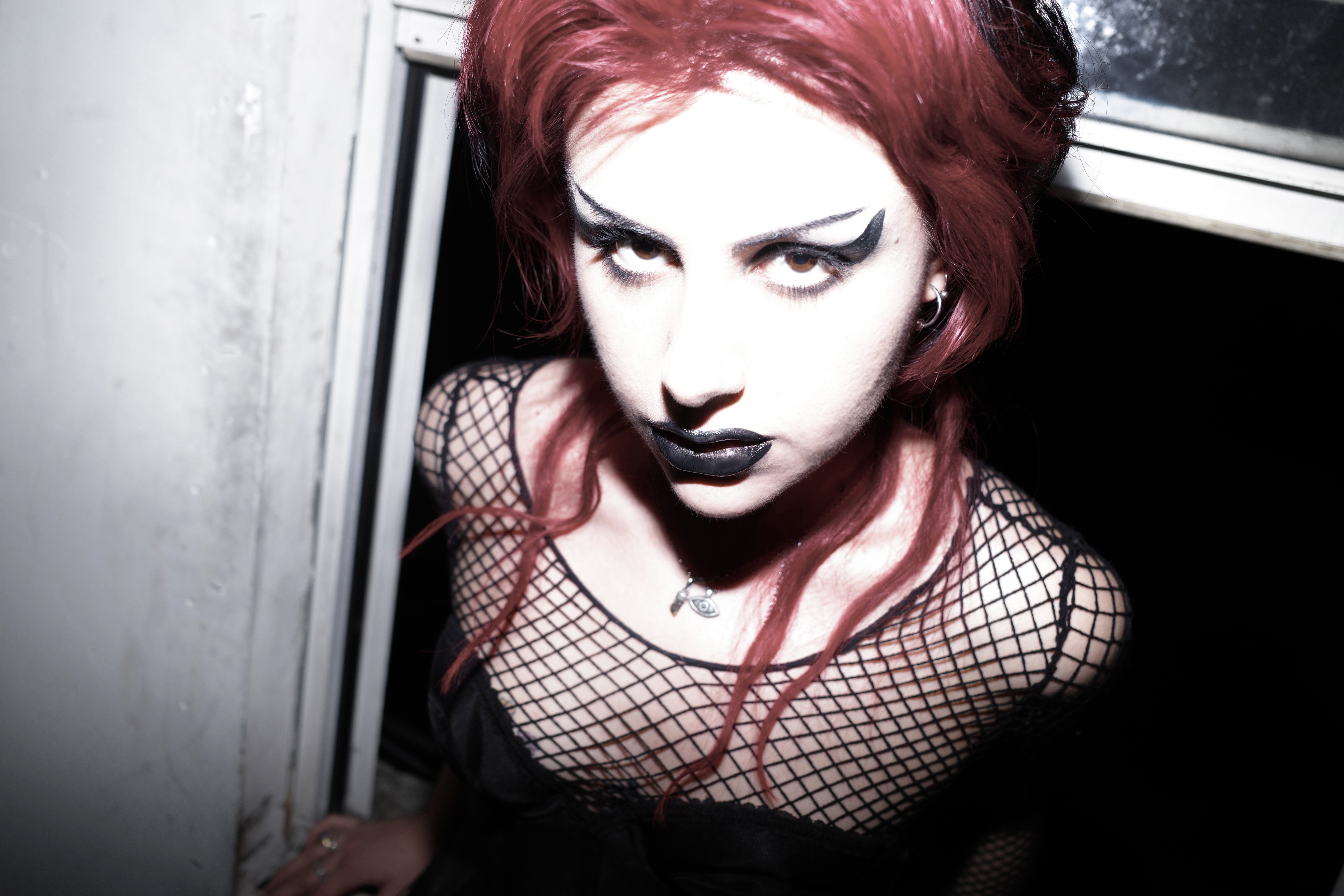
Your stage name translates to 'melody' or 'song' in Farsi. Tell me a little bit about how your Iranian upbringing influences your work.
My given name is Taraneh, it’s the name my parents chose for me. And I was named based on this dream that my dad had before I was born. Not to be too heady or anything, but in some ways I view it as a prophecy of sorts and think it would’ve been a waste to not use it as my stage name as well. The word ‘Taraneh’ is used in a lot of Persian lyricism. Growing up I’d always get so excited when I heard it in songs. I always felt like they were singing for me. I grew up between Cleveland, Ohio and Tehran, Iran. But in Cleveland, I didn’t know any other Taranehs. It was cool hearing a stranger sing my name.
My Iranian upbringing and background influences my work and the way that I frame the world in every way. It’s inextricably tied to who I am and therefore the work I make. Iranians are poets and romantics and revolutionaries. We care about freedom and liberation and self-determination and pleasure — or at least I do. And of course religion plays a pretty central role in post-revolution Iranian society so I play with a lot of religious iconography in my visual work.
This video is no exception — there are a lot of religious overtones in this video. It made sense to throw a niqab in there. I’m sure many people will find it offensive that I’m juxtaposing an objectively very sexy outfit with probably the most modest Islamic covering that exists. But beauty has always been weighed against religion for me growing up. Modesty and sexuality always went head-to-head. It’s worth laying out for me. There’s a cross in the video too — there’s certainly a lot of meaning to glean but I don’t think it’s worth overexplaining.
What's next for Taraneh?
Power and control.
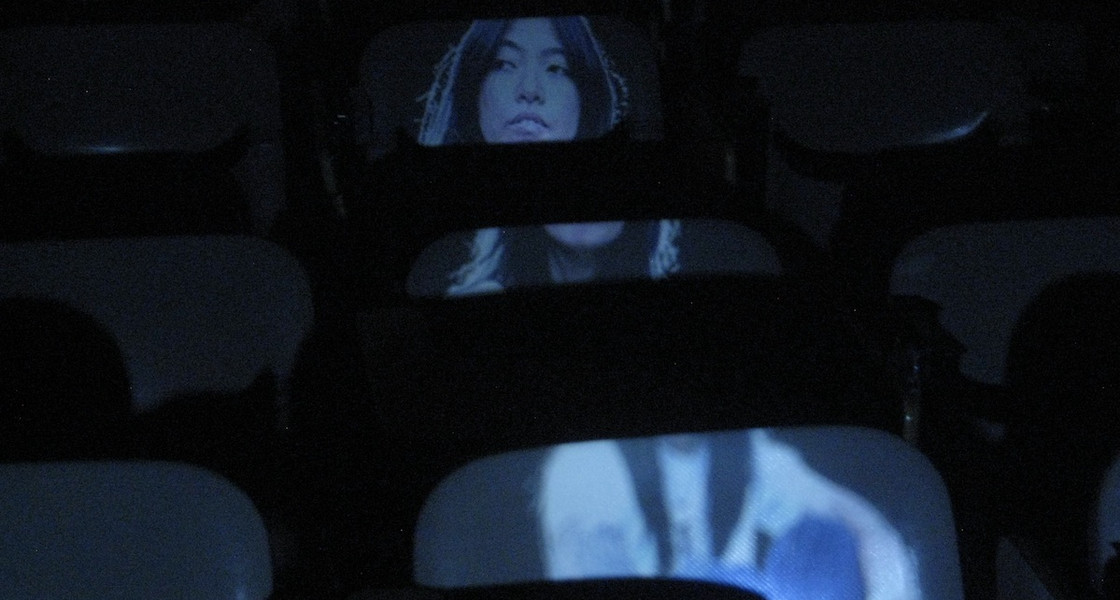
Deb Never, the LA-based Korean artist, just dropped her third and final EP — THANK YOU FOR ATTENDING. If you shudder at the thought of this being Deb’s last contribution to the world, worry not —this is her final EP before she moves onto her debut album. Full of sparkle, glitter, and earth-shattering beats, TYFA is transparently emotional and requires the listener to embrace their own vulnerability.
Listening to the EP felt like watching a short film. "5 o’clock" sets the tone for a thrilling adventure that allows you to let your hair down and escape from your obligations as if to say “fuck it let’s party.” “Mania and Bliss” cArries you to the peak of the party with its spinning, flashy beat that makes you want to headbang along (I told Deb that it reminded me of the drug scenes in the british series Skins, and she agreed). However, the comedown lies within “Paper Houses," which is melancholic and symbolic of the low following the high. Deb is no stranger to conveying undeniable emotions and grand imagery, as showcased in her short film Where Have All The Flowers Gone?
Now she is proving her readiness to join the ranks of her collaborators including Dominic Fike, Brockhampton, Tommy Genesis, and Omar Apollo, with upcoming shows in NYC, LA, and the UK.
Read our exclusive interview with Deb below.
I was listening to the EP and it was very cinematic. You can tell that there's a very clear storyline. Was that intentional?
Not necessarily a storyline but more of just a feeling. And I think that’s such good feedback to hear because I’ve had [the EP] for so long, so I don’t even know what it sounds like anymore. But from a new listener, hearing that it sounds cinematic is satisfying for me because that’s what I wanted to go for more than anything. Not much of a storyline but more a feeling — like you’re in this world, like you could see a scene of a movie with the song, you know what I mean? I think that’s super important to me.
What’s the world you want people to see?
I guess it depends for each song. There’s this journey — it does feel [like it’s] all in one world and it just reflects where I was [when] I wrote all of it. It has this party aspect where it’s high energy — you have those moments, but then you have “Paper Houses” where it’s like this ending. And then you have “Momentary Sweetheart” and “Open Season” where it’s like a love story… So it has all these elements that maybe a movie or show would have and I think that, with the EP, every song services every different moment of that movie.
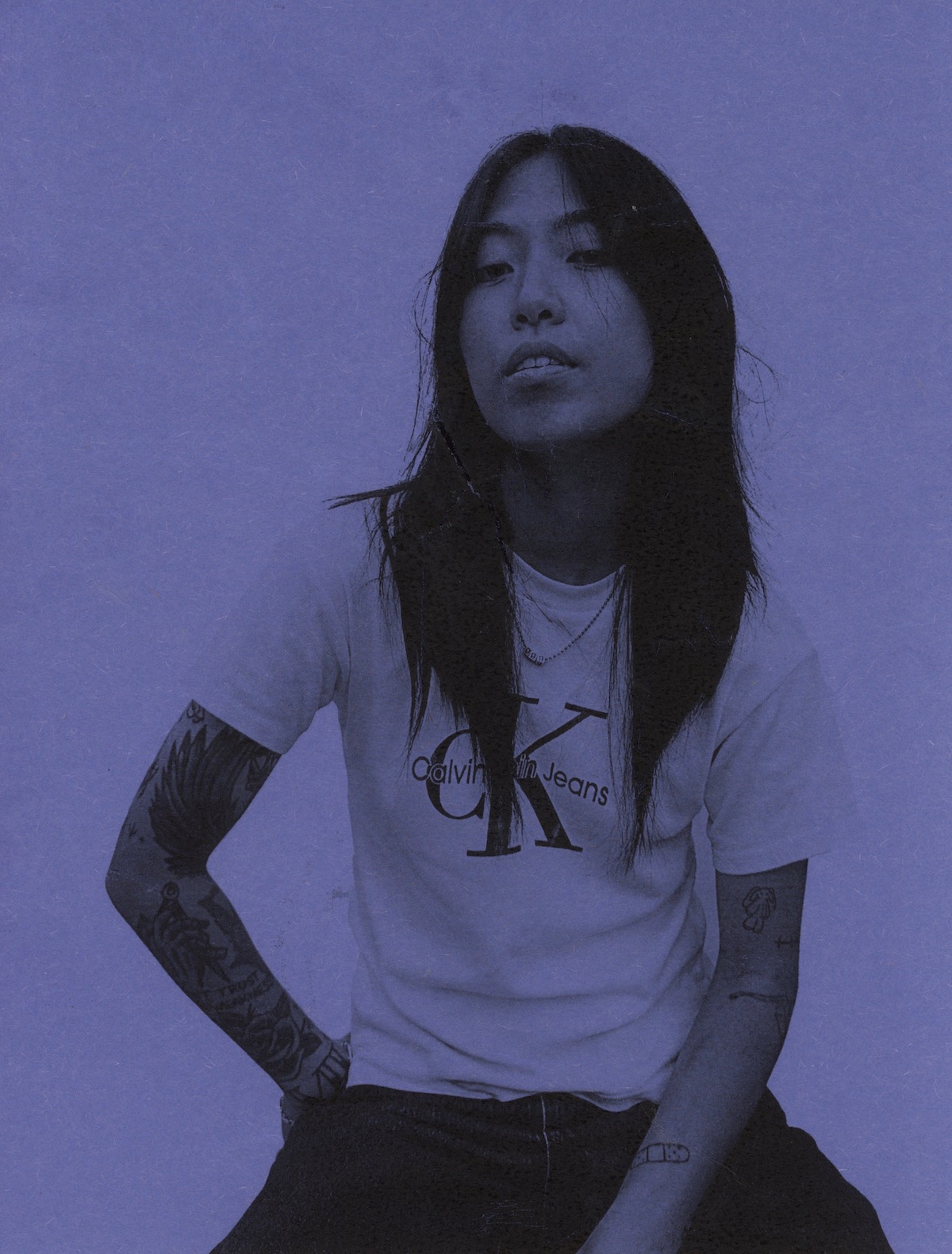
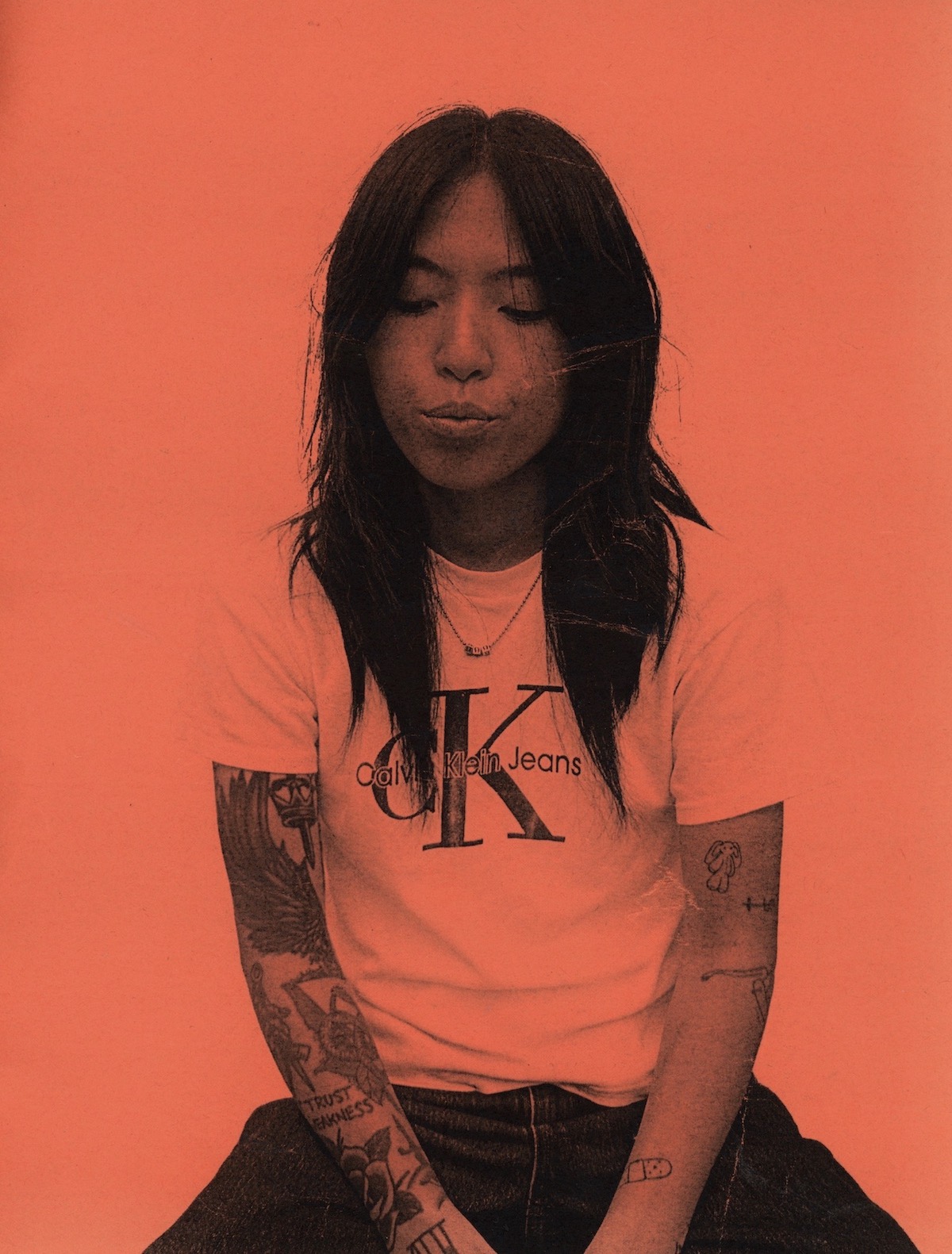
Tell me about your inspiration behind the project, specific lyrics... certain instrumentals
It’s mostly to do with growth. I initially wasn’t going to put out a third EP and I wanted to go straight into album. But since my last release, there’s so many things I’ve learned in music and in life throughout the years that I felt like I needed to put it out. I want everyone who’s listened to grow with me and to understand my process and steps, and I feel like this EP was important to put out in order to make sense of the album… I wish I could be somebody who puts out music very scarcely but I also think it’s very important for everyone to be a part of the process and to see growth. That’s what this EP really is and I’m putting in a lot more musicality and I’m stripping back on production and experimenting still. That’s still something I wanted to show.
Give me some examples of the experimentation you’ve done. Between this EP and your project before, musically, what’s changed?
I’d say in the last project, I learned a lot in making the production sound bigger and clean and [I added] a lot more guitars and I used to shy away from that a lot, especially in the first project I’ve ever done. And with this, even vocally, [I’m] focusing more on timing and my vocals and making it sound a certain away. Or, even on “Momentary” where I kind of belt a little bit more, which I haven’t really done as often… Or with “Paper Houses” — going more into the songwriting, very simple, stripping back the production so you hear every word I’m saying. Or “Open Season” is a little bit more R&B, which is the music I listened to growing up — like I don’t just make rock music. So it’s a lot of different aspects. Every song has something in there that I feel like I've learned and put in. I’m really proud of it and I wanted to share that.
Deb's musical range is undeniably impressive, showcased perfectly by the opening track "Momentary Sweetheart." This tidal wave of a song begins with vulnerable vocals before exploding into a hailstorm of electric guitar and harmonies, catching listeners off guard and refusing to give them a chance to catch their breath. The momentum continues into "5 o'clock," a trance-inducing electronic track that practically begs listeners to dance and kiss strangers under flashing lights and pounding bass.
Contrastingly, "Say" is a cute and bashful charm of a song, with bouncing lyrics that feel like bubblegum and spilled lemonade. "Open Season" invites listeners to float and kiss in midair with its shimmering guitars and magical vocal harmonies, while "Mania and Bliss" is an exploding, euphoric party anthem that leaves us breathless and stumbling in joy. Finally, "Paper Houses" brings us down to earth with its honest and vulnerable lyrics, gentle vocals, and swelling strings, grounding listeners in the power of truth and leaving nowhere to hide.
You didn't write the songs chronologically, so how’d you decide on the order? Because it flows very well.
I like to make every song just [in] the moment and then look back at everything I’ve made and try to make it make sense — almost like a DJ making a mix. What makes sense of the mood and how can I take you through an emotional journey? That’s what I did with this EP — that’s what I do with every project. It’s really important to me. Even though I feel like now people listen to songs on their own, I’m still a person who really respects and enjoys listening to a full project in order, so it’s important to me — no matter how you listen to it… that's just me being anal or whatever [laughs].
I don’t think you’re being anal.
I like for it to make sense in order and to take you through a journey, because some of my favorite projects do that.
Say more about that — you say people listen to songs as one-offs of EPs — why do you think that is and what’s your opinion of it?
It’s just the time now, I think there’s just a lot of music that gets put out — and it’s not a bad thing! I think it’s great that everyone is able to create and express and put out whatever they want... I’ll find myself doing that sometimes — where I’ll only listen to one song and not realize there’s a whole project behind it... And I think — not to be nostalgic for like [laughs] "back in the day," but back in the day, projects were albums and EPs on CDs and you had no choice but to listen to it in chronological order. The way we digest music affects how we listen to it. I appreciate the slow burn of [having] to listen to it all the way through, even if you don’t like every single song… But it’s just for me personally. I don’t want to tell people how to listen to the music. If you want to listen to it not in order that’s totally fine too! But it’s just for me to feel good about what I make.
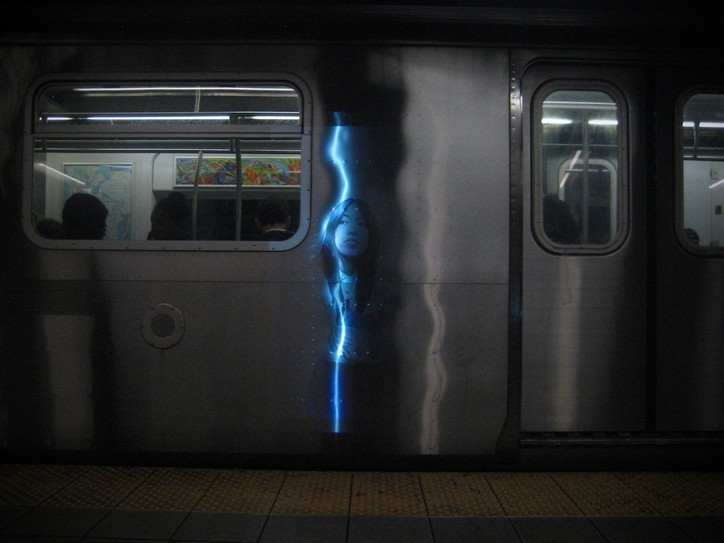
So, I know you don’t want to tell people how to listen to your album. But what should people take away from the EP?
Maybe being able to relate to it and some sort of anticipation… You know, I think the relating part is pretty self-explanatory but I think the anticipation part comes from this being the last EP before going into album, which I’m really excited about. That’s the whole point! THANK YOU FOR ATTENDING is the third and final act of this journey and anyone who’s grown with me and listened to all three projects, I hope they’d feel ready for the next thing.
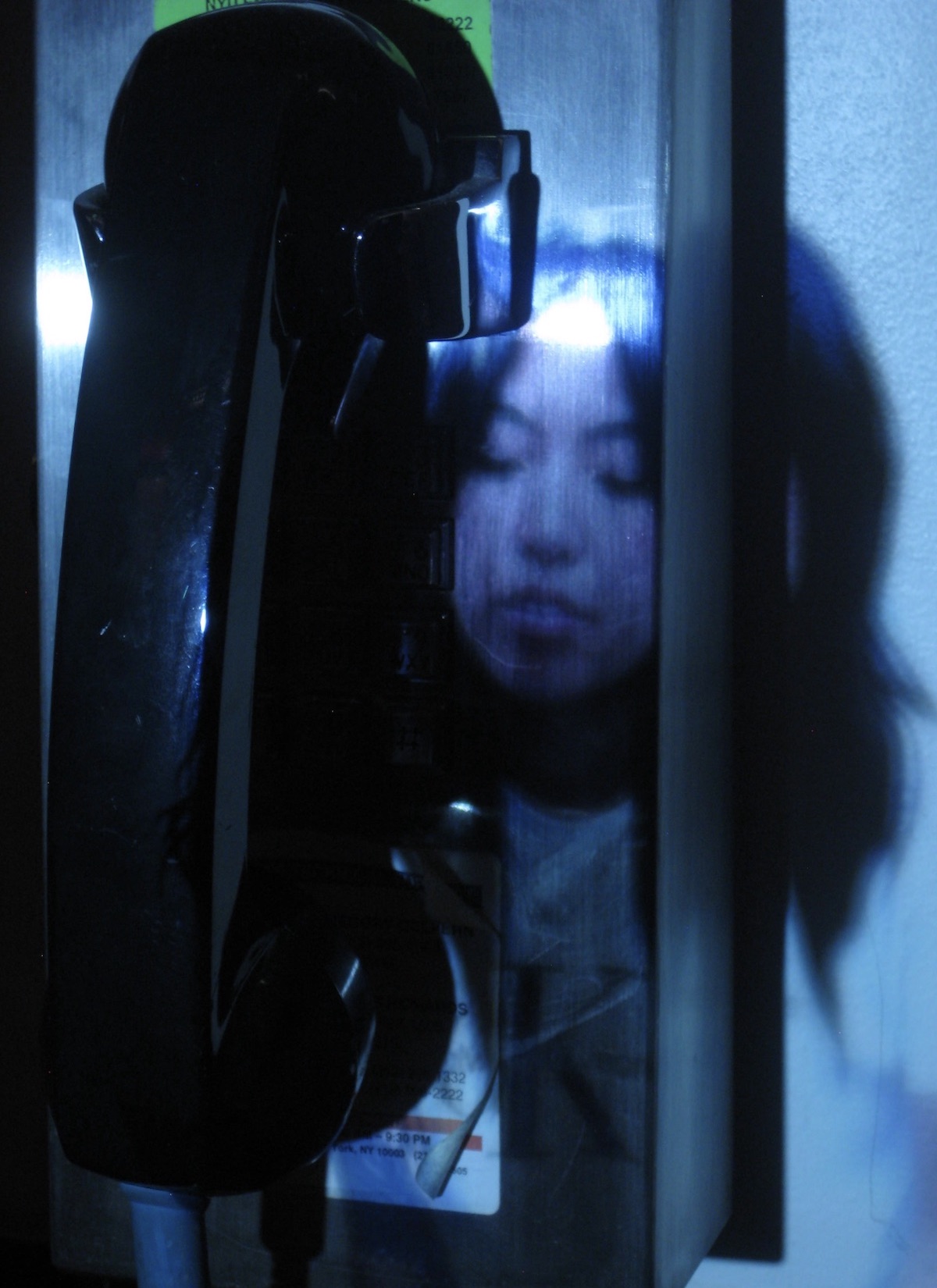
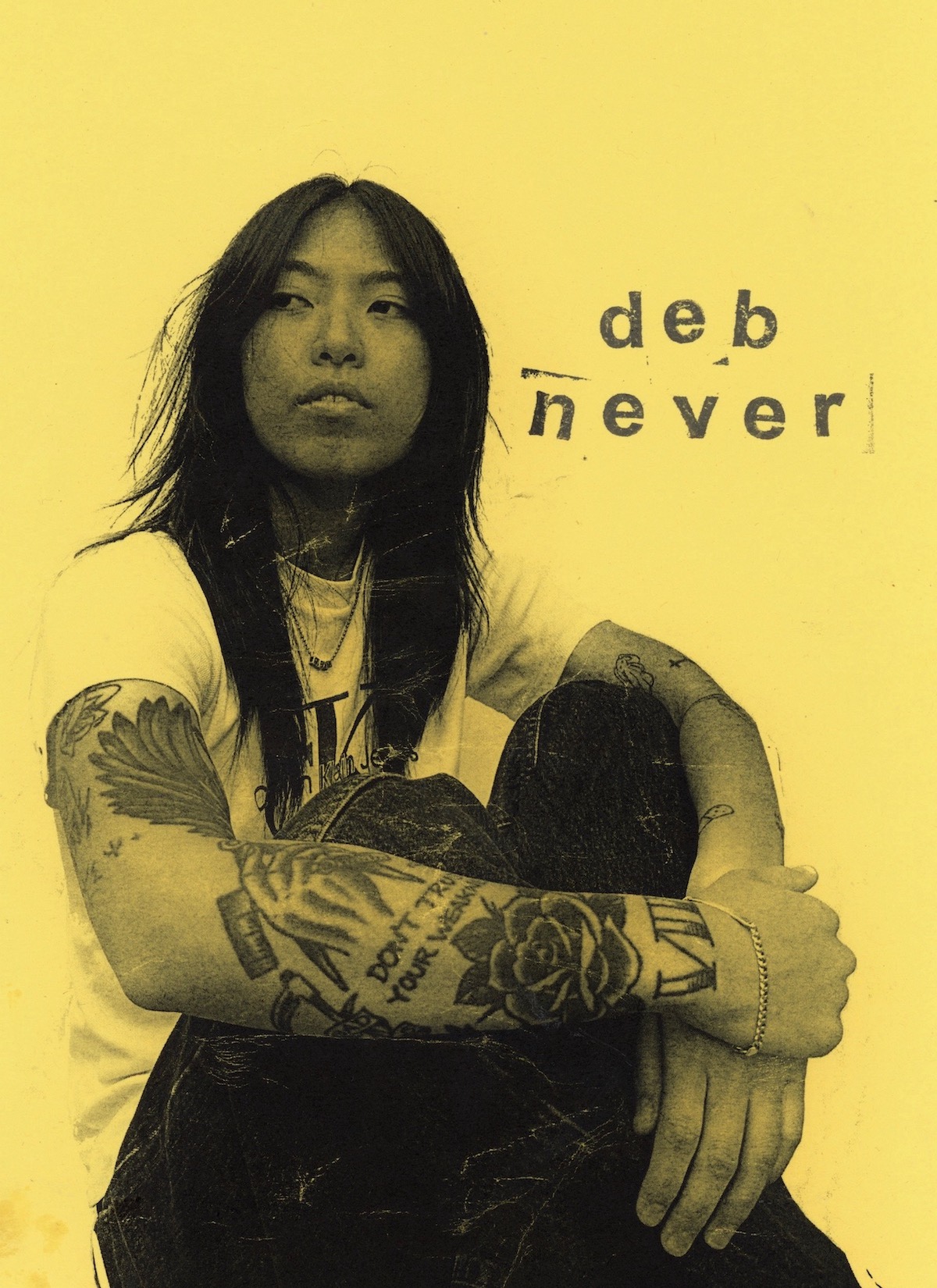
What’s next? Tight lips — for now. Although, in the interview, Deb did say that we (or I) would be the first to know, and as we all know, zoom-recorded interviews are legally binding.
So, rapid fire. One word to describe each song off the EP? “Momentary Sweetheart”
Fling.
“5 o’clock”
Partyyyy [hesitantly]… party.
“Say”
Telephone, I don’t know why… Oh — it’s because there’s this little drrring drrring in the bridge.
“Open Season”
Summer.
That makes sense…“Mania and Bliss”
Drugs. Sounds like drugs.
Oh "DRUGS" — I thought you said "rugs."
RUGS??!! [laughs]
And “Paper Houses”
Finale.
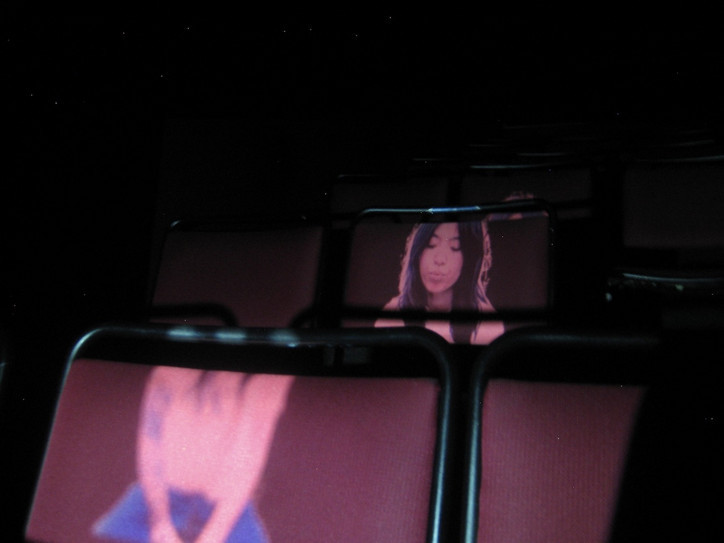
“Letting go of the finished product is the hardest part,” says Deb. Because once it’s out there, it’s not really yours.
[Liv, office intern and long-time friend of Deb's, comes crashing in]
Liv Solomon— Wait wait wait! I had one question. If you were a basketball player how tall would you be?
I’d still be 5’4….5’5…